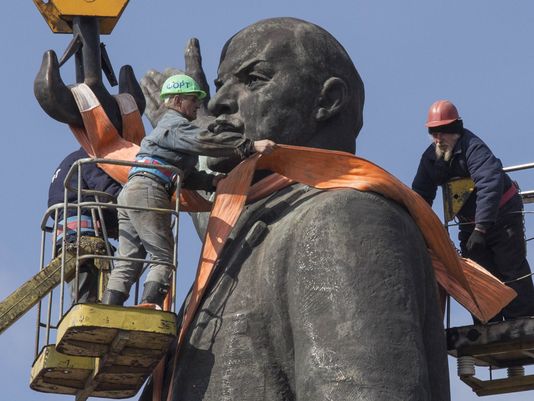Voices: Lenin statue is gone, but divisions remain in Ukraine

ZAPORIZHIA, UKRAINE As we slid into a taxi on a bone-chilling afternoon, the driver delivered the news: “Lenin kaput,” he said with a wide grin. “You want to have a look?”
We rushed to a square on the Dnieper River where, for days, workers braved freezing winds to bring down a last vestige of Communist rule in this industrial city.
Around 3 p.m. on March 17, Ukraine’s largest remaining statue of Vladimir Lenin was carted away in a flatbed truck.
When a crane lifted the founder of the Soviet state from a pink granite pedestal, fireworks exploded. Hundreds of onlookers cheered, waved blue and yellow flags and shouted, “Glory to Ukraine.”
Kateryna Markova spent 30 hours keeping a vigil for her TV station. As the 65-foot statue came down, she was overcome by emotion.
“My camera was shaking. We have waited so long for this,” said Markova, 26, who grew up across the street from the square. “All my life I could see Lenin from my window. I cannot believe he finally is gone.”
Not everyone was ecstatic.
A longing to re-establish ties to Russia runs deep in some parts of this ex-Soviet republic.
Photojournalist Frank Folwell and I were teaching at Zaporizhia National University when “Leninfell,” as some call it, was launched.
We often stopped by to watch the removal process and gauge the mood of spectators.
While one group hoisted vodka in raucous farewell toasts, others stood silently, wiping tears over Lenin’s demise.
On a rainy afternoon, an elderly woman shouted for workers to stop sawing at the base and belted out a patriotic Russian song.
A few made feeble attempts to stop the demolition. Security guards whisked them away.
Our translator explained, “There are lots of Lenin defenders and local separatists here. Some have mixed feelings.”
Grigoriy Bensman, 74, was adamant: “I am not for communism, but Lenin should stay. He is part of our history.” He credits the Soviet leader for the dam in Zaporizhia that brought electricity to the region in the 1930s.
Two young men eavesdropping nearby were not buying it. They wanted Lenin “down and out of sight. We are looking to the future, not the past,” Eugeniy Tregger, 21, said.
The sentiments in Zaporizhia are a microcosm of the ideological split that threatens to tear Ukraine apart.
On Dec. 8, 2013, Euromaidan protesters pulled down Kiev’s landmark Lenin statue, marking a turning point in the country’s political crisis. They opposed the Ukrainian government’s plans for closer ties to Moscow.
A newly elected government passed laws to obliterate Ukraine’s Communist past. Soviet symbols were banned; streets, parks and public buildings renamed.
Today, the dust from Ukraine’s past is far from settled.
Russian-backed rebels occupy territory in the Donbas region, 120 miles from Zaporizhia. More than 9,100 have been killed, and 1.5 million Ukrainians have been displaced.
On April 1, Radio Free Europe/Radio Liberty posted a headline, “Spike in fighting in eastern Ukraine threatens fragile ceasefire.”
The article noted that monitors from OSCE — Organization for Security and Cooperation in Europe — had observed evidence of Russian soldiers and weapons “since the conflict began,” a charge Russian vehemently denies.
On our last night in town, we invited five bright, English-speaking journalism students to a campus hangout for pizza and beer.
All supported closer ties to the European Union. Were they concerned war could spread to Zaporizhia?
“Sure, we are afraid. Why not? We know there are separatists here,” said Andrei, who was about to turn 20. Others nodded in agreement.
According to the students, their grandparents and “other old people” tend to idealize Soviet times, touting free education, free health care and government-subsidized apartments.
“They don’t mention the bad stuff that went on with Stalin and other Soviet leaders,” said Andrei.
As we gave farewell hugs, there was a final question: “When you return to America, what will you say about Ukraine?”
“We will say if your generation has its way, this country will be in good hands.” That led to smiles and light applause.
As we headed back to our hotel, there was lingering concern: If Russia does flex its muscle, what price will these promising young Ukrainians have to pay?
Политика конфиденциальности | Правила пользования сайтом








